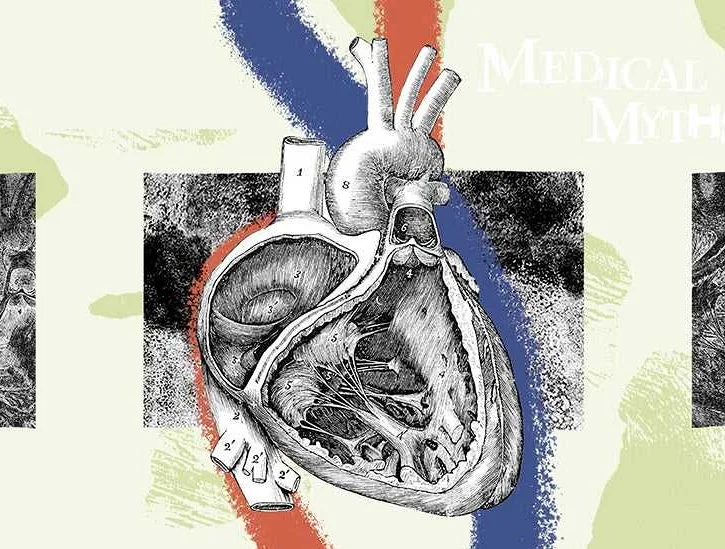Don’t be fooled: Debunking 9 common myths about heart health that could lead to a heart attack
Содержимое
Discover the truth behind 9 common myths about heart health that could put you at risk of a heart attack. Learn the facts and protect your heart health today.
Heart health is a topic that is surrounded by a lot of misinformation and misconceptions. In order to take care of our hearts and prevent heart attacks, it is important to separate fact from fiction. Unfortunately, there are many popular myths circulating that can lead to dangerous consequences if believed. In this article, we will debunk some of the most common myths about heart health.
Myth 1: Heart disease only affects older adults.
Contrary to popular belief, heart disease can affect individuals of all ages, including young adults and even children. While the risk of developing heart disease increases with age, it is important for people of all ages to adopt heart-healthy lifestyle habits and get regular check-ups to monitor their heart health.
Myth 2: Heart attacks only happen to men.
Although heart attacks are often associated with men, they can affect women as well. In fact, heart disease is the leading cause of death for women in many countries. Women may experience different symptoms of a heart attack compared to men, so it is crucial for everyone to be aware of the signs and seek medical attention immediately if they suspect a heart attack.
Myth 3: If you have a family history of heart disease, there’s nothing you can do to prevent it.
While having a family history of heart disease does increase your risk, it does not mean that you are destined to develop the condition. Adopting a healthy lifestyle that includes regular exercise, a balanced diet, not smoking, and managing stress can significantly reduce your risk, even if you have a family history of heart disease.
Myth 4: Taking aspirin every day prevents heart attacks.
While aspirin can be beneficial for certain individuals at high risk of heart attack, it is not recommended for everyone. The decision to take aspirin should be made in consultation with a healthcare professional, as it can have side effects and may not be suitable for everyone.
Myth 5: High cholesterol only comes from the foods we eat.
While diet can contribute to high cholesterol levels, it is not the only factor. Genetics, family history, and other lifestyle choices such as physical activity and smoking can also play a role. It is important to have your cholesterol levels checked regularly and work with your healthcare provider to manage them.
Myth 6: Heart disease is a man’s problem.
Heart disease is often perceived as a problem that primarily affects men, but it is a leading cause of death for both men and women. In fact, more women die from heart disease than from any other cause. It is important for women to be aware of their risk and take steps to prevent heart disease through healthy lifestyle choices.
Myth 7: You can’t have heart disease if you don’t have any symptoms.
Heart disease can often develop silently, without any noticeable symptoms. This is why regular check-ups and screenings are important, especially if you have risk factors such as high blood pressure, high cholesterol, or a family history of heart disease. Prevention and early detection are key to managing heart health.
Myth 8: If you have heart disease, you should avoid exercise.
Exercise is actually beneficial for individuals with heart disease, as it can improve heart function, reduce the risk of complications, and improve overall cardiovascular health. Of course, it is important to consult with a healthcare provider before starting an exercise program and to follow their guidance.
Myth 9: Heart disease is inevitable as you age.
While the risk of developing heart disease does increase with age, it is not inevitable. By adopting a heart-healthy lifestyle from a young age and managing risk factors, such as high blood pressure and high cholesterol, it is possible to reduce the risk of heart disease and maintain a healthy heart as you age.
By debunking these popular myths about heart health, we hope to empower individuals to take control of their heart health and make informed decisions. Remember, it is never too late to start prioritizing your heart health and taking steps towards a healthier lifestyle.
Cholesterol is always bad

One of the most common misconceptions about heart health is that all cholesterol is bad. In reality, cholesterol is a vital substance that the body needs to function properly. It plays a crucial role in the production of hormones, vitamin D, and bile acids that aid in digestion.
There are two types of cholesterol: low-density lipoprotein (LDL) and high-density lipoprotein (HDL). LDL cholesterol is often referred to as “bad” cholesterol because it can build up in the arteries and contribute to heart disease. On the other hand, HDL cholesterol is known as “good” cholesterol because it helps remove excess LDL cholesterol from the bloodstream.
While it is important to maintain healthy levels of LDL cholesterol, it is equally important to have sufficient levels of HDL cholesterol. A balanced ratio of these two types of cholesterol is key to maintaining heart health. In fact, research has shown that high levels of HDL cholesterol can actually protect against heart disease.
However, it is worth noting that the type of cholesterol you consume through your diet does play a role in your overall cholesterol levels. Foods high in saturated and trans fats, such as red meat and fried foods, can increase LDL cholesterol levels. On the other hand, foods high in unsaturated fats, like avocados and nuts, can help raise HDL cholesterol levels.
It is important to consult with your healthcare provider to understand your cholesterol levels and develop a personalized plan to keep your heart healthy. They may recommend lifestyle changes such as a healthy diet, regular exercise, and possibly medication if necessary.
So, remember that not all cholesterol is bad for you. Your body needs a balance of both LDL and HDL cholesterol to function properly. By understanding the different types of cholesterol and making healthy choices in your diet and lifestyle, you can take steps towards maintaining a healthy heart.
Heart disease only affects elderly people

One of the most common myths about heart health is that heart disease only affects elderly people. Many people believe that heart problems are something they don’t need to worry about until they are much older, but this is simply not true.
While it is true that the risk of heart disease does increase with age, it can affect people of all ages, including young adults and even children. In fact, heart disease is the leading cause of death worldwide, affecting millions of people of all ages and backgrounds.
There are many factors that can contribute to the development of heart disease, including genetics, lifestyle choices, and underlying medical conditions. Smoking, high blood pressure, high cholesterol, obesity, and a sedentary lifestyle are all risk factors that can increase the chances of developing heart disease at any age.
It’s important for people of all ages to take steps to protect their heart health. This includes eating a healthy diet, exercising regularly, not smoking, managing stress, and getting regular check-ups with a healthcare provider. By making these lifestyle changes, individuals can significantly reduce their risk of developing heart disease, regardless of their age.
So, don’t be fooled by the myth that heart disease only affects elderly people. Take control of your heart health now and start making positive changes to protect your heart for the future!
Heart attacks only happen to men
One of the most common myths about heart health is that heart attacks only happen to men. However, this myth is completely false. While it is true that men are more likely to experience heart attacks at a younger age compared to women, heart disease is the leading cause of death for both men and women.
In fact, heart disease kills more women than any other disease, including breast cancer. Women are also more likely to have a heart attack without experiencing the typical symptoms that are often associated with heart problems. This can lead to a delay in seeking medical help, which can be life-threatening.
It is important for both men and women to understand the risk factors for heart disease and to take steps to prevent it. These risk factors include high blood pressure, high cholesterol, smoking, obesity, diabetes, and a sedentary lifestyle. By making healthy lifestyle choices such as eating a balanced diet, exercising regularly, managing stress, and avoiding smoking, both men and women can reduce their risk of heart disease and heart attacks.
It is also important to note that the symptoms of a heart attack can vary between men and women. While men often experience chest pain or discomfort, women may experience symptoms such as shortness of breath, nausea, vomiting, back or jaw pain, and fatigue. It is crucial to seek medical help immediately if you or someone you know is experiencing symptoms that could indicate a heart attack.
In conclusion, heart attacks can happen to anyone, regardless of their gender. It is important to dispel the myth that heart attacks only happen to men and to be aware of the risk factors and symptoms of heart disease in order to protect our heart health.
Stress is the main cause of heart disease

One of the most common misconceptions about heart disease is that stress is the main cause. While stress can certainly contribute to heart problems, it is not the sole factor. There are a variety of risk factors for heart disease, including high blood pressure, smoking, obesity, and an unhealthy diet.
Stress can affect the heart in different ways. It can lead to unhealthy behaviors such as overeating, smoking, or excessive alcohol consumption, which can increase the risk of heart disease. Additionally, stress can cause the release of stress hormones like cortisol, which can raise blood pressure and cholesterol levels.
However, it is important to note that everyone experiences stress to some degree, and not everyone who experiences stress will develop heart disease. It is the combination of stress and other risk factors that can increase the likelihood of developing heart problems.
Managing stress is important for overall health, but it is not the only factor to consider when it comes to heart disease prevention. Leading a healthy lifestyle, including regular exercise, a balanced diet, avoiding smoking, and managing other risk factors, is crucial for maintaining heart health.
In conclusion, while stress can play a role in heart disease, it is not the main cause. It is important to understand the various risk factors and take steps to manage them in order to reduce the risk of heart problems.